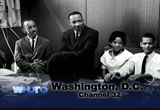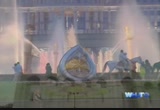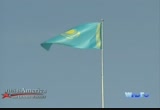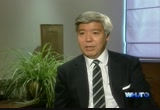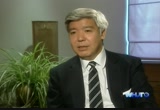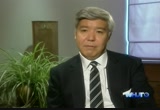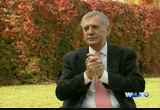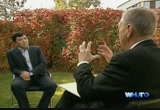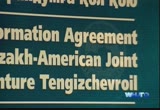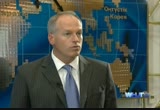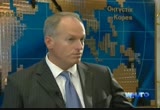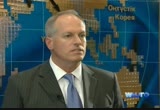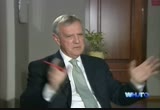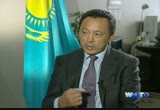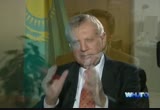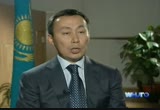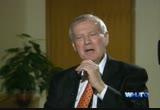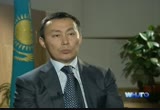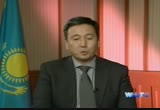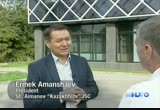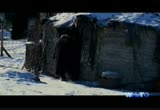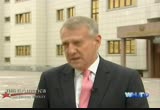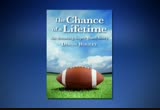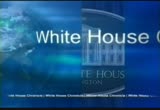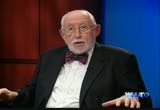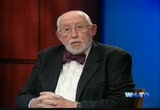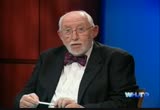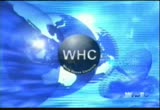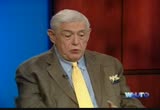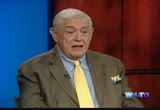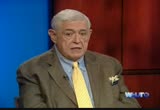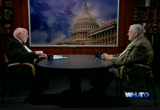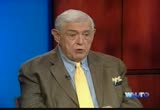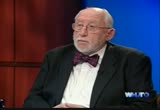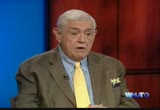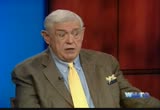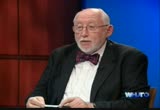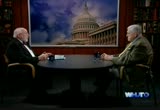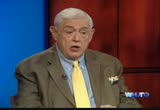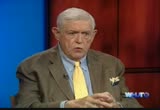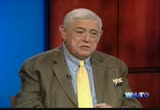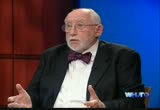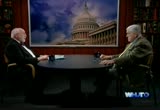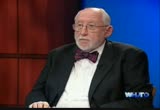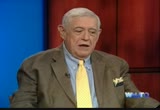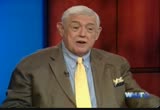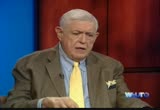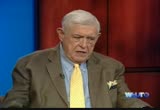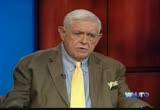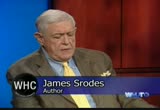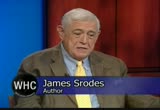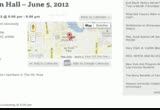tv Moyers Company PBS September 16, 2012 6:00pm-7:00pm EDT
6:00 pm
>> recently, "this is america" visited the republic of kazakhstan and central asia. kazakhstan is one of the 15 countries formed by the breakup of the soviet union, and it is the most successful of them all. on december 16, kazakhstan celebrates its 20th anniversary of independence. it is the ninth largest country in the world, and its location, oil and mineral wealth, and government's vision, have all contributed to its rapid growth internationally, kazakhstan is a world leader in the goal of eradicating nuclear-weapons on
6:01 pm
earth. it is a beautiful country of snowcapped mountains, regions of deserts', and historic and futuristic cities. with a population of 16.5 million people, kazakhstan is home to more than 100 different ethnic groups, resulting in an incredibly rich and diverse culture. over the next few programs, "this is america" will look at the culture, people, government, s of has and sight standard we will look at its importance in the region and its relationship with the united states. "this is america" visits the republic of kazakhstan. "this is america" is made possible by -- the national education association, the nation's largest advocate for children and public education.
6:02 pm
poongsan corporation, forging a higher global standard. the ctc foundation, afo communications, and the rotondaro family trust. this year, kazakhstan celebrates its 20th anniversary of independence. on this program, we will learn about what it was like before independence 20 years ago, and how oil and a visionary president made kazakhstan the success it is today and why diversifying its economy will be the key to kazakhstan's even brighter future. >> it was a while the economy,
6:03 pm
while business economy, and a great economy mainly. today, we have a lot of public companies. our businessmen are doing international joint ventures. if you take the society as a whole, are people became much more open-minded, a free, outspoken people, and we are much different from what we were before. >> has that been exciting to be a part of? >> i was 20 years old when kazakhstan became independent. our generation of businessmen, they were not that successful because they probably did not get that much influence in communist times. good times, in a good country, to create such a career is
6:04 pm
possible only i think being born in kazakhstan. after the collapse of the soviet union, 20 guys started business here, like 20 guys who started and they all became visible businessmen. later on, it was time when our presidents was in the mid 1990's managing state companies. one guy, the head of the airline company, another guy, the head of an electricity company, and i was invited to be the head of a state oil company. so of course we all went so the
6:05 pm
country, and it was also very interesting to -- he later on, we all worked in the central government, being ministers, vice ministers, etc.. it helped me to change my view on the country and the economy. i am very thankful to our president, who allowed us, who gave us such an opportunity. today we are bringing business back, and this experience which we gained helps us a lot. and so it was possible i think only in such a country as kazakhstan, because we are just
6:06 pm
a 20-year-old country. >> this is the 20th anniversary of the independence of kazakhstan. what does that mean to a businessman? >> the cats extend business community is it -- the kazakhstan business community is a contemporary. in the early 1990's, i was a student, so i've witnessed all the phases of the development of our national economy and the business sector as well. so what did independence give us? it gave us the ability to communicate with the international business communities, to be able to see their experiences and their practices. >> would you say oil is came here? and there are many different companies focused on the oil and gas.
6:07 pm
is that true? >> in regards to this issue, i would like to emphasize that the industry does play a significant and crucial role for the economy of our country. but at the same time we have other clusters of attraction of different companies such as the mining industry, metallurgy as well. >> list some of the natural resources, some of the metals we're talking about when we're talking about minerals. >> kazakhstan is believed to possess almost all minerals on the table of elements. kazakhstan extract copper, zinc, gold, silver, manganese, and other minerals. but we are global leaders in copper and zinc extraction and
6:08 pm
production. >> tell me about this huge operation right here. >> it has been in kazakhstan since 1993. it is a partnership signed between the republic of kazakhstan and chevron in 1993. current shareholders are chevron, exxon mobil -- >> you have a couple that you would not recognize. >> a financial company of kazakhstan, and a russian company. >> so a heavy investment here by the united states. >> absolutely, yes, 75% ownership from the united states oil company. >> how big is this oil that you are sitting on right here? how big, how important is it to kazakhstan and the world? >> thank you for that question. at tco, we operate the biggest,
6:09 pm
super giant oil field in the world. it would take you two marathons to run around the perimeter, it is that large. it holds between 6 billion to 9 billion barrels of reserves. we produce currently 600,000 barrels of oil per day, about 750,000 cubic feet of natural gas. to use the term barrel of oil equivalent, it is more than 700,000 barrels of oil per day. >> is it fueling the economy here? >> that is a fair statement. s direct payments are brown $66 billion. a run 2011, we are -- a new record this year in the range of $13 billion or $14 billion.
6:10 pm
>> in addition to paying the government, is that for land use, royalties? >> payments to the national oil company for their interest in the operation here. also payments to government- owned railroads, pipeline. it is a huge amount of money. >> so it is a good deal, both directions? >> we think so. it is structured that way, and a fair deal. >> the history. when was of oil discovered in the area? >> i do not know the exact date, but it was our field, in the 1920's or 1930's. >> so really the big piece takes off with the u.s. investments? >> this was discovered before we came up. the discovery was here, and back in 1985 and 1986 they had a huge blow out, and that well was on fire for more than a year. that explains the bit of a
6:11 pm
technical difficulty of the field and why the cuts extend people were looking for partners in technology. >> where does the oil and up? >> a around the world. it is not a difficult crude to refine. it goes to refineries all over the world, sold on the open market. most of it goes through russia, sold on the open market. it is found in gasoline products that you use in the united states, europe. >> how does it feel to be a person from texas heading up this huge operation here in kazakhstan? >> it is a tremendous honor for me to be here. my wife and i have enjoyed our time here tremendously. we have more than 3000 employees that we cherish and love dearly, as my own children. 85% are kazakhstan citizens now.
6:12 pm
the supervisors and managers are context and citizens as well. we have done very well over our 18-year history and we will do that going forward as well. it is a tremendous honor to lead this organization. >> oil and gas sector and occupies 26%. >> what percentage of oil and natural gas stays within kazakhstan for use here? what% is exported? >> the annual volume of oil production is about 81 million tons. out of that, 13.5 million intended for internal use in kazakhstan. otherwise, it is exported. >> what countries are the target of the exports?
6:13 pm
>> the most part is the european union, about 83%. about 15% for china, some small amount goes to russia. since russia is rich itself in oil and gas. >> what do you see happening in the area of energy in the next five or 10 years? >> after 2013, we think that the conception of energy from nuclear technology will increase. but before, we do not expect many changes. >> if the status quo will maines, kazakhstan will play a big role? -- if the status quo remains,
6:14 pm
kazakhstan will play the role? >> i think so. reserves are bigger than our current production. in a resource, for example, we are -- we are a producer of oil , we own a. 15/16.own >> agriculture is very important? >> yes, agriculture is very important to kazakhstan. a lot of people have employment in this sector. this means it is important not only from an economic standpoint, but also from the
6:15 pm
social standpoint, and the government has put a lot of effort to develop agriculture, paying attention to social and economic issues. an economic component is also very important. this involves the development of new technologies, and this also improves the economic opponent of the agricultural sector. the revenues are going up. we know that the product prices going up from year to year, and this is a problem for the whole world, and kazakhstan to some extent is in a beneficial situation due to that. another component in the framework of this sector is cattle breeding. we are putting a lot of efforts into this segment. this means we have to focus more on the development -- it means
6:16 pm
that we have to diversify the crops that we're growing right now, we have to think about cattle. this is also positively impact in -- >> i read that this has been a record year for agriculture here in kazakhstan. what made it so, and how does that impact the exports from kazakhstan abroad? >> any producer, any farmer of course desires to get as much yield as possible and to get as much revenue as possible. the record yield this year means that the revenues will get
6:17 pm
higher. the exports will get higher, too. this will result in an increase of capital investments, investments to other things, into equipment, and ultimately a personal level, individual level. within the last 10 years we are one of the big 10 producers, exporters of grain. in the last six years, we are 6 and 7. in terms of exports as well, and the last five years we are number one in the world. >> tourism in kazakhstan. is it growing? >> kazakhstan became independent 20 years ago, and we have had -- during that period, we have
6:18 pm
achieved the main principles in our policies, such as we have to be united, we have to have stable and prospering countries, and we have to develop. as you might know, in april of this year, there was a government meeting where it was decided, according to the president, to develop tourism, which should be compared in terms of turnover, revenues, with the retina in the oil and gas sector. >> -- with the revenue in the oil and gas sector. >> so this is an opportunity for the government to increase productivity as far as gdp is concerned? >> no doubt. it is the sector where jobs creation has five times missed
6:19 pm
when compared with other industries. it is not only about the development of tourism but about job creation in the country. it is about exposing kazakhstan as an open country, a country known for its great hospitality. the government wants to develop tourism, and the government participates in projects in terms of financing, providing assistance in creating infrastructure. you might know about the mega project for kazakhstan, which deals with the construction of the highway, western europe, eastern china, which repeats the ancient way to bring goods back and forth. this is also about development of sightseeing and places of interest. another project which is dealing
6:20 pm
with the infrastructure development, such as the creation of a new city, the construction of international airports, an area intended to attract people to visit kazakhstan. >> it sounds to me like the film business is big business in kazakhstan. is that right? >> i would say the main mechanism of the industry of film and has extend started working in recent years. the reason why, last year the number of tickets sold grew five times bigger in comparison to the previous year. >> so not only the making of films, but people going to the films? >> i can give you only two figures. within the last three years, the
6:21 pm
number of kazakhstan films in theaters grew three times. the number of viewers grew six times. >> are you doing productions right here in this building? >> currently, it is the film studio of the country. this country is producing about 80% to 85% of all the films in kazakhstan. >> is it a private organization, a business organization? does the government support the arts? >> it is 100% government owned film company. >> so the government supports the arts here? >> very strongly supports the arts. >> it is not only a city, but it
6:22 pm
is a larger area. can you tell me about that? >> population is a round 553 -- is around 550,000, out of which zaks.s native cossackha >> the oil industry has fueled the growth of the area. >> of course, oil has contributed a lot to the development of our country. it puts the focus on small and medium business, which is the number one focus for the government. over 20 years, we've established 130, created 30,000 jobs here. >> diversification is the name
6:23 pm
of the game, isn't it? >> this is the number one economy -- the number one priority. last year we put into operation seven new industries. this year, by the end of this year, we're going to come up with an additional 15 facilities. >> is that here? >> yes, of course. it is also in the construction, pharmaceuticals, chemicals, and -- >> how do people feel in kazakhstan about the changing of the country as the 20th anniversary is now here? >> first of all, it is the quality of life, the quality of
6:24 pm
each person. housing became affordable 20 years ago and became possible. it seems to be normal now. 20 years ago, i entered the university, and i was a student. you know what, 20 years ago, because of the problems with insecurity, i had to do my homework using -- with electricity, i had to do my homework using candles. >> would you say context don is a democracy? >> no doubt. -- would you say kazakhstan is a democracy? >> no doubt. \ will notice that all the laws, that kazakhstan's democracy is going on, is developing.
6:25 pm
[music playing] >> special thanks to the ritz hotels in kazakhstan. for information about my new book, "the chance of a lifetime," and online video for all this is america programs, visit our website, "thisisamerica.net. "this is america" is made possible by -- the national education association, the nation's largest advocate for children and public education. poongsan corporation, forging a
6:26 pm
higher global standard. the ctc foundation, afo communications, and the rotondaro family trust. whether at home or traveling abroad, our goal is to use our weekly "this is america" program to learn about the social, political, and cultural lives about people around the world. we call it this is america and the world. in the desert of downtown singapore, we talk with guests who are learning about the entire world. you can see all of our programs at thisisamerica.net and
6:30 pm
captioned by the national captioning institute --www.ncicap.org-- >> hello, i am llewellyn king. the host of "white house chronicle," which is coming right up. but first, a few thoughts of my own. i met a marvelous man on the way to the studio this morning, unloading a truck outside of a restaurant. we had a lovely conversation.
6:31 pm
he said it is friday, and i said it is friday. it was, indeed. it is in the friday. i said you have got a long way to go. he said, no, not bad, seven deliveries, 250 miles. it is a piece of cake. i thought how wonderful, a hard- working, working man. we do not acknowledge the existence of anybody who works at that kind of work anymore because politically we put everybody into this great middle-class. but i think we should not put everybody into the middle class. we should have other differentiation, like my father who was a mechanic. he was not in the middle class. he thought of the middle-class as white caller people. he worked with his hands, and he was in another class. it used to be called the working class. i think that is a bit pejorative
6:32 pm
today, but if we will have differentiation, which should not tell anybody something which they actually are not, which is this greater morph, this thing called the middle-class. the other wonderful thing about people who do real jobs, real work, who really make a difference, is that they like the work. my friend this morning, they work and they like what they do, which is a great thing if you have the right job. i find in the middle class, the white caller people, the people who move papers rather than moving boxes and heavy objects, they tend to want to be identified by where they work, not what they do. i will tell you that in journalism we see this all the ed a publication some years ago and everybody was terribly interested in working
6:33 pm
on it because it was small and obscure. as it became somewhat more successful, all sorts of people wanted to work on it. when they found out they could get a better job somewhere else, they were enthusiastic. there is a tendency in the middle class, particularly the college-educated middle class, not to care about the work for itself but about the definition that comes with the work. my friend of today was marvelous and refreshing because he likes the work and did not care about the definition of the work. i will be right back with one of the most interesting authors writing today, an old friend of mine named james srodes, and he has written a fabulous book, which i am glad to rip cord is flying off the shelves, about the -- to report is flying off the shelves, about the progressive movement. we will find him fascinating and charming to boot.
6:34 pm
>> many have spoken on the need to transition to a clean energy future. at exxon, we are acting. by 2020 -- at exelon, we are acting. by 2020, we will displace gas emissions by greeting our operations, helping our customers reduce emissions, and helping with low carbon electricity in the workplace -- in the marketplace. at exelon, we're taking action and seeing results. >> "white house chronicle" is produced in collaboration with whut, howard university television. and now your program host, nationally syndicated columnist llewellyn king, and co-host linda gasparello. >> hello again, and thank you so much for having us along.
6:35 pm
i'm so glad to have you here and so glad that you are about to meet james srodes, who goes by the name of jim, who has written "on dupont circle: -- "one dupont circle." it is literally a traffic circle in washington, d.c. how did he come in shaping the time he lives in? >> well, the point you raised earlier in your commentary is good for this book. this is a story about 12 people who we now know as monumental historical figures. but at the beginning of this story, they are very ordinary people. just like us. they are heir to all the failings and faults. >> you have developed a modesty that i do not remember, james.
6:36 pm
>> one does not think of frank -- of franklin roosevelt as being an ordinary man, yet all of his life he was terribly cash-strapped. >> as was churchill, by the way. >> absolutely. as for felix frankfurter, the great supreme court justice, and walter lippmann, the most influential political commentator of the 20th century, they all began in bachelor's boarding houses, or in apartments or, in the roosevelts' case, in a gift house given them, loaned to them by a cousin. >> boarding houses have died out. that is a pity because boarding houses, you created instant friends, salt the need for singles bars and an introductory -- solved the need for singles bars and an introductory system. >> there was a house h street
6:37 pm
where the metropolitan club is that was a boarding house for young state department diplomats. >> this is in downtown washington, not far from the white house. what period does this begin? >> the book begins in 1916, and franklin roosevelt -- frank roosevelt, as he was known in those days, was an assistant secretary of the navy. walter lippmann and felix frankfurter and herbert hoover, who was probably at that point the best known and best loved progressive of his day -- everybody all gathered around dupont circle to live, to socialize, and one of the places they socialized was a bachelor's boarding house just off the circle. a rather shabby place where frankfurter and walter lippmann lives along with two other british diplomats who would
6:38 pm
later loom very large in our history. it was called the house of truth. it was called that by oliver wendell holmes, the supreme court justice, who was there sort of got father and sat at the head of the table, on these midget sort of got father and sat at the head of the table on these -- sort of godfather who sat at the head of the table, as people dance to the very sexy music called jazz. >> played on -- >> on victorrolas, yes indeed. >> but thought about this word progressive. there were communists, socialists, liberals, progressive is. where in this avery of the left did progressives fit in?
6:39 pm
>> they were kind of like noah's ark. there were where all the left gathered. that was one of the problems of the progressive movement. it did not catch on because there were so many definitions of what it meant. >> if it did not catch on, how come the book on the cover says it changed the world we live in today? >> it did not become the third political party or the second political party? >> it did take over the democratic party. >> its influence, which was in the republican party of theodore roosevelt, informed the democratic party when franklin roosevelt took over later. >> a particular residential area in london posted what became the socialist movement, and in some cases the communist movement, outside of russia?
6:40 pm
>> these people were of a common educational background. they were of the first birth and station. herbert hoover was an orphan waste as a -- was an orphan raised as a quaker. >> fascinating to know that hoover was one of these because we think of him as this doctrinaire republican, depending on who you listened to, did either the right or wrong things at the onset of the depression. >> what unified them -- because there were prohibitionists, suffragists, people who advocated euthanasia. there were people who advocated a mild form of christian communism. all within the tent of the progressive movement. what united them was a belief in science. science was their religion. >> so the and white men.
6:41 pm
>> you tell me what the data is, i will tell you -- >> so the enlightenment. >> you tell me what the data is. he saved belgium from starving to death. in the first years of world war i. he came back to washington to run woodrow wilson's food program. he was so beloved that in 1920, frank roosevelt asked him to run for president as a democrat. he, roosevelt, would run as his vice president. >> how extraordinary. do we have any other movements that can be traced in our time, thinking of the conservatives, the people today who dominate conservatism. there are a bunch of names that sort of came in after barry goldwater and reshaped conservative party.
6:42 pm
is that analogous, in any way? >> well, these young people, mind you now we are talking 1960. these are people in their 20's. they were informed by their professors -- dewey and santayana and other university people, harvard people who preached a reform movement as necessary to solving problems of the american city, which was in many cases near anarchy. so they were united by this face. science became their religion. -- by this faith. science became their religion. they understood that they could make the world anew, one of the reasons they joined with wilson in going to paris in 1919, to remake in effect europe.
6:43 pm
>> none of which actually worked out in the end. >> it was a good first effort. that is my take on it. it could never have succeeded. >> i am going to take a little station break here, and i want you to know how we were informed by science today. i want to know where our passion for building comes from this belief in scientific answers to artistic questions. for the benefit of our radio listeners, on sirius-xm radio, can be heard on saturdays. we are very glad to have those listeners, and i'm talking with james srodes, the author of "one dupont circle: franklin and
6:44 pm
eleanor roosevelt and the progressives who shaped our world." we can be seen globally on the broadcast outlets on the voice of america. james, next question. today everything we try to measure it. does this come out of that love of scientists -- that love of science, the scientific solution? >> absolutely. >> polling shows there are synthetic news organizations that report what they have been told as hard news, and it changes things. >> it has replaced reporting. >> we have been through other periods like that. there was a period when business reporters, which both you and i did once, where to call up analysts. we said, wait a minute, why don't you just go find out, wdo not have these targets do
6:45 pm
it. how much of the rest of today's world was shaken by this thinking? and this fascination with this belief that science could be the basis of good government and social justice. >> well, it informed, among other things, a brand new concept of the role of america as the world's sponsor of democracy. that we could show other nations how to live their lives. that was not a concept that even theodore roosevelt, at his most bullish, embraced. but woodrow wilson gave an effort, gave kind of the first step on the way to assigning america the job of being the policeman of the world, the moral arbiter of the world, and the government invented -- inventor for the rest of the world, rather -- whether the
6:46 pm
rest of the world wanted it or not. that extends from this belief in their own ability to see the truth, tell the truth, and dictate the truth. >> you mentioned it was under this rather big tent of progressives that there was a christian socialist elements. >> oh, yes. >> but on the whole, these were not the borough that identified with religious fervor. >> well, they rejected orthodox established religion as being unfit for the 20th-century's problems. that is why they embraced science to extent that seems kind of naive today. today we have debates over what they're in tears -- various scientific facts mean. >> james, we have debates over whatever is a fact. >> in those days, it was implicit that you would give me
6:47 pm
the raw data -- all this led to of sociology,iaces political science, and so on. >> i think sociology was already a discipline, was it not? >> it was implied. but these people actually set up bureaus to gather data and then dictate rules. among the rules, for example -- the real laws against the sedation and mixed marriages and so on really did not come until the 1920's's as part of a public health movement. >> good gracious, i did not know that. for the benefit of listeners and viewers, it is interracial marriage. it became taboo, and there were laws passed against it. the progressives produce
6:48 pm
something very regressive. >> in hindsight, yes. they believed in enforced sterilization of the mentally ill. holmes wrote a terrible decision in 1927 justifying a virginia law that allowed for forced sterilization of people who were judged to be mentally deficient. that was played back to us by the nazis less than 10 years later. >> for all the social conscience, they did not seem to care much about the african- american community. >> very little, and they were not really interested in specific ethnic groups either. their philosophy was a rising tide lifts all boats. >> the people on the deck were white and the people at the helm were white. >> more specifically, as long as the people in the command center were them. >> how very strange. is our politics any different today? >> absolutely not.
6:49 pm
the point of this book is that these people that we justly praised and honor for their tremendous sacrifices and accomplishments were at heart just ordinary men and women like us, with some really bizarre failings, many of them -- and i will list franklin roosevelt being won -- could not hold public office today because of his private life, let alone because of his health problems. >> you mentioned private life. were they, as happens in movements, very involved with each other romantically, sexually? >> there was at least one case of walter lippmann running off with someone else's wife, divorcing his own. the sexual peccadilloes of many of them -- allen dulles, the founder of the cia, was a notorious philanderer. roosevelt's serial the trails of
6:50 pm
elinor, and -- serial the trails betrayals --eleanor. >> this was the crucible, but it was not anything more than that? >> most people do not understand that these people knew each other when they were in their 20's. that it moved from dupont circle to paris in 1919, where they all worked on the paris peace conference. again, they were thrown together in a very tight circle for six months in paris, of all places. then the sat -- the book is about the next 20 years when they go off on their 20 years. but are in and out of each other's lives. and then come together again in 1939. >> you have always, in the last four decades, been fairly conservative yourself. what led you to write this book? >> well, i challenge that.
6:51 pm
i like to think of myself as being very rigidly non-partisan, but it just so happens i work for business magazines and i guess that does tar me with -- >> last time you were on this program, you were taking quite a conservative point of view, but i apologize if i mischaracterized -- >> no, not at all. >> what led you to write this book? the question is still valid. >> i came upon writing this book during a photo research for the allen dulles biography. i found these very young people, george marshall, john foster dulles, arguing the german reparations with an even younger john maynard keynes of the british treasury. i said this is really interesting. these people were in their 20's, at the most in their 30's, and
6:52 pm
they were given tremendous power to redraw the map of europe. no other international conference of any size or shape -- >> you might mention that they also allowed the redrawing of many other maps. >> they created in iraq, palestine. >> very powerful. >> yugoslavia, czechoslovakia, poland. it went on and on, and everyone of them had to be done by a committee of british, french, an american staff before woodrow wilson ever saw the documents. >> earlier in the broadcast you said that in the book there were two greats there were very influential, but you did not mention that. >> one of them was used as percy, another one would be philip carr, and he would be the british ambassador to washington in 1940, which is when this book comes to its climax. franklin roosevelt gathers a
6:53 pm
secret research staff of many of these same people to begin planning american postwar policy even before we are in the war. it was a terribly risky maneuver. had the isolationists' found out about it, it would have denied him his third term in office. that program, which started at the council of foreign relations in new york, finally was folded into the state department, became the organizing mechanism for both the atlantic charter that churchill and roosevelt signed in 1942, and in the outlying for the united nations, which we have today, hence shaped our world today. >> is there anybody in the book that you particularly like to, which you would like to have been able to interview, to sit down with a tape recorder running, and talk late into the night?
6:54 pm
>> the bad boy in the book is a man named william bullitt. >> i have heard of him. >> he was a very charismatic, troubled, brilliant fellow who was roosevelt's first ambassador to the soviet union in 1933, and subsequently roosevelt's ambassador to france, just as it was falling. he is kind of the villain because he comes back to washington at the start of america's involvement in the war, expecting to be made secretary of the navy. he does not get it. wants to become secretary of state or at least under secretary of state, finds his way blocked by a roosevelt protege of extraordinary brilliance, probably the smartest and most talented diplomat we have ever had of the 20th-century, a man named sumner welles, who among other things, when he was -- he was the father
6:55 pm
of the good neighbor policy. e was sober, was the father of the good neighbor policy. >> one gathers from your comment that he was not always sober. >> but when he drank, he became a promiscuous, dangerous homosexual. he was a ticking time bomb. william bullitt started to out him, trying to force roosevelt potts had to fire him and get him out of the way. all of this comes to a head just as they are putting together the details of the united nations and the atlantic charter. it could have cost roosevelt his fourth term in office. it could have -- we could have
6:56 pm
ended up without any united nations at all. it is a real detective story with a climax at the end. >> you have written other books, one on john delorean, ben franklin. what other books have you written, and how have they informed this book, if at all? >> i started doing the photo research for my allen dulles biography, which was back in 2000. all of my books -- one of the reasons i do not stick to a theme like the civil war, the revolution -- is that i find an answer questions in standard history. it is not deliberate, it is just the limitations of the historical craft. they start to vex me. if you start with the question, how did we get a united nations? when the league of nations
6:57 pm
continued in operation until 1944, and start scrolling back and back and back, then suddenly you find you have a really ripping yarn. >> when did you find out you were a historian as well as a journalist? >> i do not claim to be a historian. that presumes that you have had academic training. i am still a journalist, still telling stories. i use academic research techniques, but i still write narrative nonfiction. >> james, you are an interesting man. it has been an honor to have you on the broadcast. that has been our show today, and we will be back on our same stations, same radio, television next week in the interim, all the best.
6:58 pm
captioned by the national captioning institute --www.ncicap.org-- >> many have spoken out on the need to transition to a clean energy future. at exelon, we are acting. i 2020, we are committed to offsetting emissions by helping our customers reduce our emissions and offering more low carbon electricity in the marketplace. we are taking action and seeing results. >> "white house chronicle" is produced in collaboration with whut, howard university television. from washington, d.c., this has been "white house chronicle," a weekly analysis of the news with insight and a sense of
6:59 pm
232 Views
IN COLLECTIONS
WETA (PBS) Television Archive
Television Archive  Television Archive News Search Service
Television Archive News Search Service 
Uploaded by TV Archive on

 Live Music Archive
Live Music Archive Librivox Free Audio
Librivox Free Audio Metropolitan Museum
Metropolitan Museum Cleveland Museum of Art
Cleveland Museum of Art Internet Arcade
Internet Arcade Console Living Room
Console Living Room Books to Borrow
Books to Borrow Open Library
Open Library TV News
TV News Understanding 9/11
Understanding 9/11